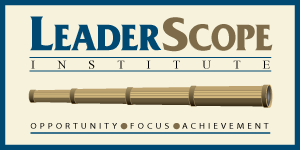"Leadership Matters"
— A Management Newsletter —

Turning Around a Declining Business
Let's say a business within your company has
matured, and you must manage its declining circumstances. Revenues are down, and there's
enough competition
that your products have become mere commodities. Sales are slipping,
and new technologies are threatening your business's very existence.
What do you do?
This is the scenario faced by many in the newspaper industry, but
some managers are taking active steps to turn things around. At one
major metropolitan newspaper, we met John Maher, a manager whose
marketing group found a way to generate new revenue and cut costs.
Maher saw the writing on the wall, and began thinking a lot about
new opportunities. He and his team formulated a plan, and determined
a way to execute the plan through effective delegation and
structure.
When Maher thinks about assigning work to others, he thinks about
accountability, authority and resources. "Assigning the work
requires all three of these things. Clarity on these things has made
all the difference," Maher says.
"I can pay attention to
long-term issues without sacrificing short-term results."
The turnaround started when Maher began to focus clearly on what was
most important for his department. Specifically, he trained his
focus on three things: increasing revenue, increasing circulation
and extending the brand. Very simple, but it became a mantra for his
group. If an activity does not contribute to at least one of these
things, they don't do it.
This clearer focus and more effective direction in assigning the
work have given Maher more time to think. "My outlook on time has
changed," he says. "I can pay attention to long-term issues without
sacrificing short-term results." While he remains focused on present
performance, he also pays attention to the longer-term priorities and
planning that eventually make all the difference for bottom-line
results.
For example, he now looks to see what changes will be coming within
a year or two and be prepared when the changes occur. Clearer
delegation has given him more time for this; by better focusing
people on what is important, he has been able to eliminate
unnecessary work.
In addition, he seeks the same kind of clarity on projects that are assigned
to him from above, either getting greater clarity or postponing those where the accountability is poorly defined or the
authority is too diffused to allow for effective action. This has
freed up time for him to focus on higher-impact priorities.
While he has been able to make jobs bigger for his direct reports, he has also been able to
decrease payroll cost by eliminating unnecessary or non-value-added
activities. His payroll costs declined by 13% through a more
efficient staff that is now closer to the work.
So how has Maher's marketing department done in the three target
areas? For revenue, Maher helped his group literally transform
itself from a cost center supporting circulation to a revenue
producer. From zero revenue, the marketing group is expected to
drive more than $1,000,000 per year within three years, much at
significant margins.
Maher's group conceived new promotional campaigns, and managed them internally
rather than outsourcing, significantly impacting both revenue and
cost. And many
of the projects are aimed at increasing circulation — an important
function of his department. A recent promotion drove $500,000 and
increased daily single copy sales by 10% during the promotion.
Overall, gross copies through marketing promotions increased from
1.68 million to 2.96 in two years, and new home-delivery
subscriptions soared.
Extending the brand is also evident. One product promotion
substantially enhanced the brand. Data show that 97% of respondents
had an improved or unchanged perception of the publication, and
perhaps more remarkably, some of the few who were dissatisfied with
the promotion actually had an improved perception of the
publication.
Maher is quick to assign credit for all this to his staff. Managers in his
department say that the bar is set high and that they have more
authority and autonomy. They also exhibit more initiative and
creativity. One manager asked to collect a rights fee when making a
deal to use the newspaper's image on fast food cups. "I was not
involved with this," Maher said. "She assumed authority based on
what her job was." She turned a brand extension opportunity into a
revenue driver.
Maher speculates that his staff is more opportunistic because of the
experience they gain by having bigger jobs. "They think of things
like rights fees because they are involved in deals where other
companies request rights fees on their brands."
Maher has had fun growing his people — while helping them get better
results. And their activities have helped a mature, declining
business improve its prospects for the future.
Click here to SUBSCRIBE to "Leadership Matters" free of charge. Just type "SUBSCRIBE" in the message area, and include your contact info. *We never share our lists. We will email you when we publish a new issue of "Leadership Matters" and you can easily unsubscribe at any time.
| "Outstanding content delivery. Very inspiring, applicable and immediately useful at work." |
| Curt
Hassler Global Licensing Manager DuPont Clean Technologiess |
